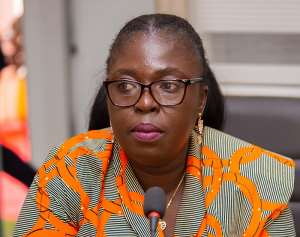
It is trite knowledge globally that the unemployment rate of Persons with Disability (PWDs) is far above those without disability. PWDs, for example, are not considered potential members of the workforce as perceptions, myths, and prejudices continue to limit public understanding and acceptance of disability in workplaces.
In a bid to address the unemployment situation of PWDs in Ghana, successive governments introduced policies and programmes aimed at increasing the opportunities for the employment of PWDs. Typically, among others, is the legal policies such as Sections 9 -13 of the PWDs Act, 2005, (Act 715), Article 27 of the United Nations Conventions on the Right of PWDs and Sections 47-53 of the Labour Act, 2003, (Act 651).
Other interventions include setting up a rehabilitation Centre to provide skill training, the Youth Employment Programme, the Government revolving loan scheme across the country and the District Common Fund for PWDS.
Despite these efforts, the employment levels of PWDs remain low and questions have been raised as to whether or not the strategies that were put in place could not achieve the purpose of ensuring equal opportunities for the labour force in the labour market.
In a significant step towards ensuring fair treatment and equal opportunities for Persons With Disability (PWDs) in the world of work, Ghana is seeking to emulate the examples of developed countries like Spain, Canada, and South Africa among others to promote the employment of vulnerable and minority groups with the aid of an Employment Equity Policy (EEP).
On Thursday, 29th June, 2023, the Ministry of Employment and Labour Relations (MELR) in collaboration with key stakeholders, organized the first stakeholders’ engagement workshop on a Draft Employment Equity Policy (EEP) for vulnerable groups in Ghana.
The EEP seeks to address the labour protection needs of vulnerable populations and promote inclusivity within the workforce. The Draft EEP, developed in partnership with the National Council on Persons with Disability (NCPD) and the Ghana Federation of Disability Organizations (GFD), received sponsorship from Promoting Equal Rights for Women and Girls with Disabilities in Ghana (PERD), and implementation support from women-led organizations such as Planned Parenthood Association of Ghana (PPAG), AfCHuRSD, and WIN. The Dutch Embassy in Ghana has provided funding for this crucial initiative.
The Draft EEP recognizes that certain populations, including persons with disabilities, face unique challenges and barriers when seeking employment, often resulting in their exclusion from the workforce.
By addressing these disparities, the EEP strives to create a more inclusive and fair treatment in employment through the elimination of discrimination in diverse labour market in Ghana, implementing affirmative action measures to redress the disadvantages in employment experienced by the vulnerable groups and also assist to eradicate the systematic barriers to employment and advancement of members of the designated groups.
The collaboration with the MELR, NCPD, GFD, PERD, and other women-led organizations underscores the collective commitment to promoting inclusivity and advocating for the rights of vulnerable groups. This partnership brings together the expertise, knowledge, and resources necessary to develop and implement effective policies that protect the labour rights of those who have historically been marginalized.
The workshop served as a platform for meaningful dialogue, where participants discussed the challenges faced by vulnerable groups in the employment sector and explored strategies to ensure equal opportunities and fair treatment. The inputs and insights gathered during the workshop would be vital in shaping the final version of the EEP.
Once finalized, the EEP will play a crucial role in shaping Ghana’s labour landscape, ensuring that vulnerable populations are not only provided with equal opportunities but also receive adequate labour protection, thus avoiding discrimination, unequal pay, and limited access to employment for vulnerable groups, thereby creating a level playing field where everyone can contribute to and benefit from the nation’s economic growth.
In conclusion, as Ghana continues to strive for sustainable and inclusive development, the implementation of the EEP will serve as a beacon of hope, ensuring that no one is left behind in the pursuit of decent work and economic empowerment.
The writer is a Head of Public Affairs Units of the MELR & a staff of ISD.




 Court dismisses Serwaa Amihere case against Henry Fitz, two others
Court dismisses Serwaa Amihere case against Henry Fitz, two others
 Stolen BRVs: Bi-partisan parliamentary probe non-negotiable — Dr. Omane Boamah
Stolen BRVs: Bi-partisan parliamentary probe non-negotiable — Dr. Omane Boamah
 Bawumia begins regional campaign tour on Monday
Bawumia begins regional campaign tour on Monday
 With great urgency backed by verifiable data, facts and figures dismiss COCOBOD,...
With great urgency backed by verifiable data, facts and figures dismiss COCOBOD,...
 EC’s statement on obsolete BVDs discovery “lies, half-truths, pure fantasies” – ...
EC’s statement on obsolete BVDs discovery “lies, half-truths, pure fantasies” – ...
 Nalerigu court impound vehicles of DCE, Director of Chereponi district for owing...
Nalerigu court impound vehicles of DCE, Director of Chereponi district for owing...
 Cop, 7 others grabbed over $523,000 Gold Scam
Cop, 7 others grabbed over $523,000 Gold Scam
 Akufo-Addo’s driver wins Dadekotopon NPP Parliamentary Primary
Akufo-Addo’s driver wins Dadekotopon NPP Parliamentary Primary
 Investigate, jail persons liable for GRA-SML contract – Manasseh
Investigate, jail persons liable for GRA-SML contract – Manasseh
 Lawyer wins Akan NPP Parliamentary Candidate primary
Lawyer wins Akan NPP Parliamentary Candidate primary
